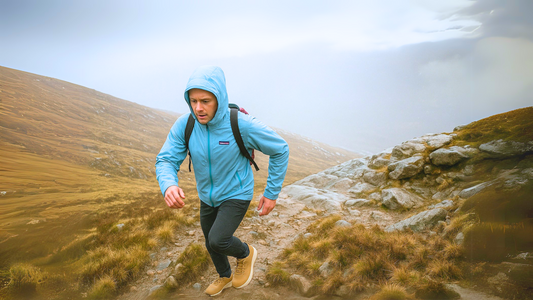
Running is *The* Passion Worth Building
10 Minute Read
Yes, it is THE passion worth building. Step aside, model airplanes. Hit the road, ship-in-a-bottle people.
If you’re reading this, presumably we’re in agreement. Running is a passion that changes who we are, and transforms lives.
But what is it that actually makes running so compelling? Why does it make us feel the way we feel, and what’s happening in our brains that makes running deeply satisfying?
Let’s get into the psychological reasons that make running the passion worth building, and how consistency is the secret-sauce of passion building.
“The Runner’s High”
Have to start with this one right?
One of the most well-known phenomena among runners is the “runner’s high.” This is not a myth, but a scientifically backed experience. When we run, our brains release a cocktail of endorphins, dopamine, and serotonin. Endorphins, often referred to as the body's natural painkillers, help to reduce pain and induce feelings of pleasure. Dopamine, the “feel-good” neurotransmitter, plays a crucial role in reward and motivation, while serotonin helps regulate mood and anxiety.
Pretty great combination of stuff right there.
The effect of these chemicals creates a sense of euphoria and well-being that can be incredibly addictive in the best possible way. This runner’s high encourages us to keep coming back to running, reinforcing it as a passion. And the regular release of these mood-boosting chemicals means that even on rest days, our overall mood can remain elevated, leading to a generally happier and more balanced life.
It’s also nice to know that caffeine strengthens the release of these chemicals. Add some electrolytes too, and you’re golden.
Everything is Training
The principles we learn from running always have parallels in other aspects of life. The athletes at Long Run have come up with our own phrase - "everything is training."
In running, we take rest days, drop weeks, increase mileage slowly over time, incorporate speed work and long runs, etc. When we learn these principles and implement them in our running, it’s a powerful realization to experience that these principles actually work. And we can apply this approach to other areas of life, whether it's career development, personal growth, or learning new hobbies.
Rest days/weeks in running helps us avoid overtraining/burnout and promotes recovery, which is equally important in other pursuits. Occasionally, we challenge ourselves with long runs, akin to tackling significant life projects. This holistic approach underscores that the discipline and strategies we develop through running are transferable to all aspects of life.
These are very basic examples, but we urge you to think about this more! Even the most niche principles can often be applied elsewhere.
Neuroplasticity and Mental Resilience
Running also promotes neuroplasticity, the brain's ability to adapt and form new neural connections. Regular aerobic exercise like running increases the production of brain-derived neurotrophic factor (BDNF), a protein that supports the growth and survival of neurons. BDNF is crucial for learning, memory, and higher thinking.
As we run consistently, these neurobiological changes enhance our mental resilience. The act of pushing through physical challenges builds mental toughness, teaching us perseverance and discipline. Developing mental resilience ultimately makes life easier, as we become more adept at handling stress and setbacks in all areas of our lives.
The Power of Routine and Habituation
Psychologically, humans thrive on routine and habituation. When we establish running as a regular part of our lives, it becomes a stable routine that provides structure and predictability. This stability is comforting and can reduce anxiety and stress.
Moreover, the consistency of running helps build a habit loop: cue, routine, reward. The cue might be brewing your electrolyte infused coffee, the routine is the run itself, and the reward is the endorphin rush and sense of accomplishment. As this habit loop strengthens, running becomes an ingrained part of our identity and daily life, further solidifying it as a passion.
Social Connection and Community
Humans are social creatures, and running offers ample opportunities for social interaction. Joining running groups, participating in races, or even just connecting with other runners online creates a sense of community and belonging.
Oftentimes, seeing the word community makes it sound like this is an in-person connection. But it's not! There is an entire world of content through YouTube and podcasts that truly make us a part of the running community. It's a special group of people, and consuming content truly helps us feel a part of it. Social interactions are known to boost oxytocin levels, which enhance feelings of trust and bonding.
The Long-Term Mental Health Benefits
Consistent running has been shown to have profound long-term mental health benefits. Regular runners report lower levels of depression and anxiety, better stress management, and improved cognitive function. The act of running serves as a form of moving meditation, providing mental clarity and a break from daily stressors.
Conclusion
Running is the passion worth building because it offers a unique blend of physiological, psychological, and social benefits. The euphoric runner’s high, enhanced neuroplasticity, the comfort of routine, the satisfaction of goal achievement, and the sense of community all contribute to making running an unparalleled passion to build.


















